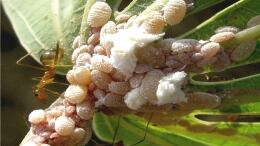Speaking before a House committee on food security hearing, the American agricultural giant stressed that genetically-modified crops which produce greater yields and are more resistant to drought and pests were essential for productivity.
The committee is considering the possibility of allowing the use of biotechnology and genetically modified crops to become more widespread in the country in the face of concerns over future food security.
Agricultural productivity in the Philippines remains at similar levels to those of the year 2000, Monsanto’s senior regional expert for scientific affairs, Harvey Glink, warned the panel. This output, he said, would not be sufficient to feed a population that is fast approaching 1m.
“Farmers are requesting scientists to develop high-yielding crop hybrids that are also resistant to weeds, insect pests and stress such as drought, in order to conserve on resources,” Glick said.
Citing a 2014 study, he said that biotechnology could raise crop yield by 22%, reduce pesticide use by 37% and increase profits by 68% through higher output and lower costs.
The Philippines is already the world’s twelfth biggest producer of GM crops—a position it achieved last year when 415,000 farmers planted Bt corn crops across 831,000 hectares.
The crop has helped enable the Philippines to become self-sufficient in corn, which it has since begun to export to countries including South Korea.
While the subject of expanding genetic modification of crops is as polarising in the Philippines as it is in many other countries, the issue of food security has forced it to prominence.
“There is a need to make people aware of the benefits of biotechnology. At the same time, the information and process of using this science and its role on food security must be harnessed and made available to naysayers and skeptics,” said food security committee chairman Sharon Garin.
“Even among my fellow legislators, there is still no consensus on the benefits of biotechnology on crop output. My committee will make sure that venues such as this forum will be available for knowledge sharing among policy makers,” she said.
Addressing the committee, Glick said the Philippines was a leader among Asean countries in giving its farmers a choice of whether to use cutting-edge technology or conventional methods on their corn farms.
But he added that the government should do more by encouraging farmers to use biotechnology to boost production.
More stories from Southeast Asia…
FAO recognises Thailand for its part in wiping out cassava mealybug pest
Thailand’s agriculture ministry has won the Edouard Saouma award for spearheading regional collaboration to combat a destructive crop pest with the help of a tiny wasp.

The Saouma award is presented by the Food and Agriculture Organisation of the United Nations each year to institutions that have implemented with particular efficiency a project funded by FAO's Technical Cooperation Programme.
Thailand played a key role in providing on-site training, technology and supplies of the parasitic wasp Anagyrus lopezi to its neighbours to destroy a mealybug predator, according to the FAO.
Four years ago, Thailand’s agriculture department raised and released 6m pairs of the tiny insect, which was first used in the 1980s in a successful biocontrol programme in Africa. The wasp is a natural predator of the cassava pink mealybug (pictured), which injects a toxin into the cassava plant while feeding on its leaves and stems.
When the mealybug appeared in Thailand in 2009, it was serious a concern for the region. After the country appealed to the International Institute of Tropical Agriculture in Benin for assistance, the institute provided a small stock of the bug-killing wasp, which were bred and released in Thailand in 2011.
A. lopezi is adaptable to a wide range of environmental conditions and succeeds in controlling the cassava mealybug by injecting its eggs into the insect. The pest population falls dramatically as the eggs hatch and the larvae feed on the mealybugs.
It took a decade for scientists in Africa to control a mealybug epidemic that began there in the 1970s and threatened to wipe out cassava production across the continent. Thailand, though, saw significant results in just a few years.
Along with training on ecological pest management, the wasp’s impact helped reduce 176m infested hectares in May 2009 to just 11 hectares by October 2013.
Thailand's growers alone account for more than 60% of global cassava exports—and combined with neighbouring Vietnam, Laos and Cambodia, the figure reaches 90%. On the mealybug’s appearance, Thailand’s Department of Agriculture estimated losses of 40-50%, adding up to more than US$150-200m in crop damage in the first year alone.
Around 5m southeast Asian farmers grow cassava for domestic and foreign processors, which convert the starch crop to a range of products including tapioca, glue and ethanol.
When the presence of cassava pink mealybug was discovered in the Greater Mekong region, Thailand’s agriculture authorities offered to share their expertise through an FAO-led technical co-operation project.
This supported studies on the ecology of insect pests and their natural enemies, and provided technical assistance to produce large numbers of biocontrol agents, such as the wasps.
All of the countries with cassava mealybug populations are now equipped with the technical skills to quickly produce and release the wasps on a large scale, the FAO said.
Other awardees at the FAO’s annual ceremony in Rome included the African Union Commission, the National Geographic Society and the non-profit World Rural Forum.
FAO director-general José Graziano da Silva congratulated the winners and said: "Our mission now is to help countries to achieve the sustainable development goal, and prepare a greater event in 2030 to celebrate the eradication of hunger and extreme poverty.
“We have the conditions for that. Let us be the first generation free from hunger. Let us all work together to make it a reality.”
Indonesia mulls sugar tax while Filipino farmers make voices heard
With the Philippines preparing legislation to introduce a sugar tax on soft drinks, neighbouring Indonesia could now follow suit after officials began a study into the policy.

A previous similar tax had a devastating impact on the drinks industry when it was introduced years ago. But sales of sweetened beverages have since seen double-digit annual growth after this luxury tax was lifted in 2004.
Now, finance officials have asked the Health Ministry to study whether sugary drinks constitute a health threat, which would make them eligible to join an excise list of high-bracket tax items, Suahasil Nazara, head of the ministry’s Fiscal Policy Agency, told the Wall Street Journal.
In the Philippines, where a bill to impose PHP10 (US$0.21) on each litre of sweetened beverages has been passing through government, sugarcane planters have come out in opposition to the move.
Concerned that drinks manufacturers will not include the tax in the retail prices of their products, and instead push suppliers into shaving their margins, the National Federation of Sugarcane Planters said its members would bear the brunt of the tax.
“We need to make our voices heard so that our national leaders will understand the plight of the sugar industry, particularly the tens of thousands of marginalised sugar farmers who will be further burdened by this proposed tax,” said Enrique Rojas, its president.
“Our planters are already burdened by value-added tax and creditable withholding tax. Now they want to impose additional burden on us with this so-called soft drink tax. We cannot absorb this proposed tax which is simply excessive and unfair.”
Senatorial candidate Martin Romualdez also joined the debate by urging lawmakers to slow down with their sugar tax plans.
“The proposed law might benefit the national coffers but it surely would serve as the final nail on the coffin of the already dying sugar industry in the country,” Romualdez said.
However, the bill has been enjoying political support and was recently passed by the government’s ways and means committee.
